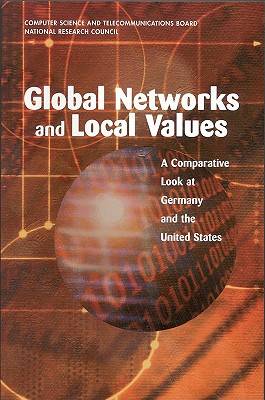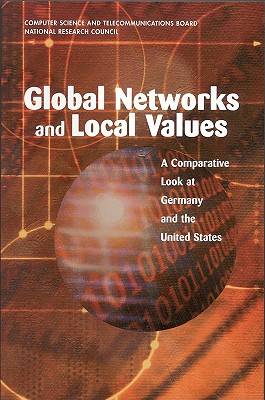
- Afhalen na 1 uur in een winkel met voorraad
- Gratis thuislevering in België vanaf € 30
- Ruim aanbod met 7 miljoen producten
- Afhalen na 1 uur in een winkel met voorraad
- Gratis thuislevering in België vanaf € 30
- Ruim aanbod met 7 miljoen producten
Zoeken
Global Networks and Local Values
Preparing Communities for Global Communication and Information Flows
National Research Council, Division on Engineering and Physical Sciences, Computer Science and Telecommunications Board, Committee to Study Global Networks and Local Values
Paperback | Engels
€ 30,95
+ 61 punten
Omschrijving
Whether you call it the third wave, the information revolution, or the virtually connected world, the implications of a global information network are profound. As a society, we want to forestall the possible negative impacts without closing the door to the potential benefits. But how?
Global Networks and Local Values provides perspective and direction, focusing on the relationship between global information networks and local values-that is, the political, economic, and cultural norms that shape our daily lives. This book is structured around an illuminating comparison between U.S. and German approaches toward global communication and information flow. (The United States and Germany are selected as two industrialized, highly networked countries with significant social differences.)
Global Networks and Local Values captures the larger context of technology and culture, explores the political and commercial institutions where the global network functions, and highlights specific issues such as taxation, privacy, free speech, and more. The committee contrasts the technical uniformity that makes global communication possible with the diversity of the communities being served and explores the prospects that problems resulting from technology can be resolved by still more technology. This thoughtful volume will be of interest to everyone concerned about the social implications of the global Internet.
Global Networks and Local Values provides perspective and direction, focusing on the relationship between global information networks and local values-that is, the political, economic, and cultural norms that shape our daily lives. This book is structured around an illuminating comparison between U.S. and German approaches toward global communication and information flow. (The United States and Germany are selected as two industrialized, highly networked countries with significant social differences.)
Global Networks and Local Values captures the larger context of technology and culture, explores the political and commercial institutions where the global network functions, and highlights specific issues such as taxation, privacy, free speech, and more. The committee contrasts the technical uniformity that makes global communication possible with the diversity of the communities being served and explores the prospects that problems resulting from technology can be resolved by still more technology. This thoughtful volume will be of interest to everyone concerned about the social implications of the global Internet.
Specificaties
Betrokkenen
- Auteur(s):
- Uitgeverij:
Inhoud
- Aantal bladzijden:
- 260
- Taal:
- Engels
Eigenschappen
- Productcode (EAN):
- 9780309073103
- Verschijningsdatum:
- 31/01/2002
- Uitvoering:
- Paperback
- Formaat:
- Trade paperback (VS)
- Afmetingen:
- 152 mm x 230 mm
- Gewicht:
- 435 g

Alleen bij Standaard Boekhandel
+ 61 punten op je klantenkaart van Standaard Boekhandel
Beoordelingen
We publiceren alleen reviews die voldoen aan de voorwaarden voor reviews. Bekijk onze voorwaarden voor reviews.











